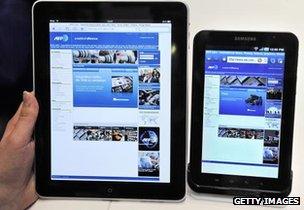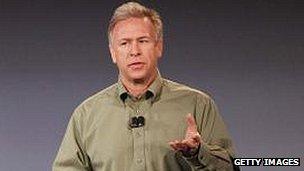Samsung rebuked by patent judge in trial against Apple
- Published

Apple claims Samsung's tablet, seen on the right, infringed one of its design patent
A judge has rebuked Samsung after it sent a press release at the start of a patent trial involving the South Korean tech firm and Apple.
Judge Lucy Koh said there had been "a wilful attempt to propagate... evidence they knew had been excluded" from the case.
She added there had been a risk "of a jury taint".
However, she rejected Apple's request that she rule some of its patents valid in order to punish Samsung.
Samsung's PR agency emailed a nine-page presentation to reporters on Tuesday.
It contained evidence that Apple had based one of its handset prototypes on what it thought a Sony-based iPhone might look like. The aim was to undermine its right to a design patent.
It also showed a Samsung handset, which the firm suggested showed it had been working on iPhone-like design before Apple's device had been unveiled.
The judge blocked the details because she said the South Korean firm had tried to introduce them too late into the legal process.
But a statement from Samsung, included in its press release, said: "Fundamental fairness requires that the jury decide the case based on all the evidence."
Apple subsequently claimed it had been an attempt to "pollute the jury".
Samsung denied this, but Judge Koh said "consequences" might be appropriate after the trial ended.
But she added that for now she would "not let any theatrics or any sideshow distract us from what we are here to do".
She did, however, question each of the jurors to confirm they had not read any of the news articles containing the banned information.
Objection overload

Apple's Phil Schiller suggested the iPhone created a "new second category of smartphones"
The case centres on Apple's allegation that Samsung infringed seven of its patents and owes it $2.5bn (£1.6bn) in damages, and the South Korean firm's counter-claim that its rival has breached five of its intellectual properties and should be paying it an unspecified share of its mobile device revenues.
The jury is expected to hear a total of four weeks of evidence.
But the judge has also voiced her frustration at delays caused by the number of objections each side was making about the other.
As a result she has now ruled that time taken to lodge each objection will be deducted from each side's time as a disincentive.
Apple's vice president of worldwide marketing, Philip Schiller, was the first witness to testify after the trial resumed on Friday.
He attributed the iPad's success to the fact that "customers value beautiful products and that they can identify with the company that makes them", according to a transcript provided by Forbes magazine, external.
His statement is an attempt to demonstrate the value of Apple's design patents and suggest Samsung had caused it harm by infringing them.
Speaking on the first day of the trial, Mr Schiller told the jury: "I was pretty shocked at the appearance of the Galaxy S phone and the extent it appeared to copy Apple products."
He claimed that when he saw Samsung's Galaxy Tab, "I thought they've done it again, they're just going to copy our whole product line."
The Galaxy Tab maker denies the charge, saying its rival's patent "shows little more than a blank rectangle" and it would go against legal precedent to allow it to "monopolise the shape of an article".
- Published2 August 2012
- Published1 August 2012
- Published30 July 2012